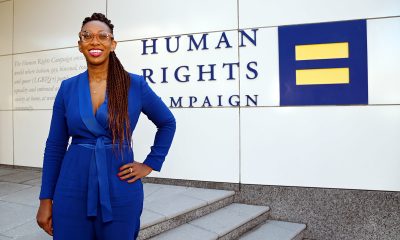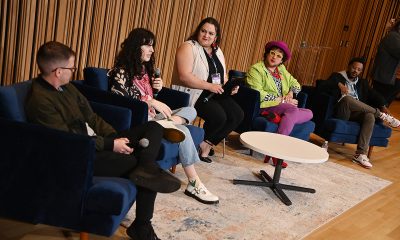District of Columbia
Concern over possible D.C. juvenile crime wave targeting LGBTQ victims
Anger, frustration at attorney general’s ‘Listening Session’ in Dupont Circle
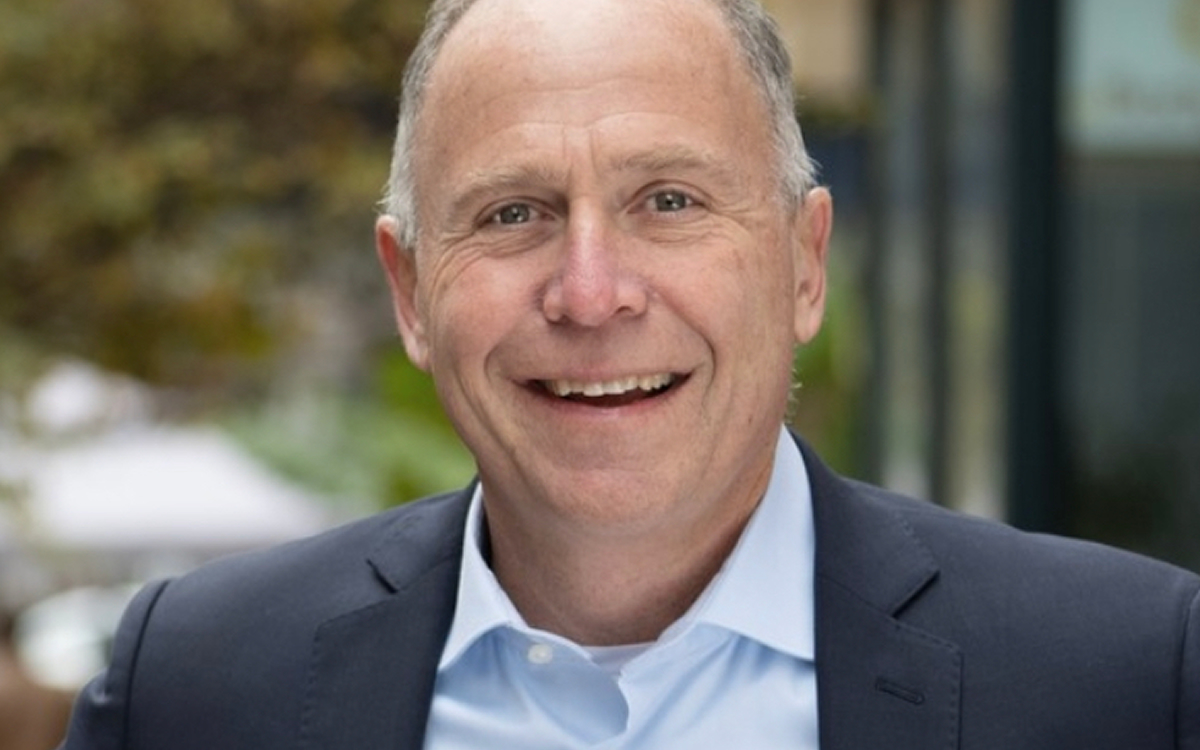
The rapidly growing number of violent crimes in the nation’s capital committed by juveniles armed with guns and knives that D.C. Mayor Muriel Bowser has called a juvenile crime emergency is surfacing in neighborhoods where LGBTQ people are likely being targeted, according to activists following local crime reports.
Concern over reports of cases where LGBTQ people may have been targeted for armed robberies and carjackings in the Dupont Circle area by juvenile assailants coming to the area from other parts of the city surfaced at a Feb. 28 Ward 2 Listening Session hosted by D.C. Attorney General Brian Schwalb.
The event, held at St. Thomas’ Parish Church in the Dupont Circle neighborhood, included strongly worded presentations from Dupont Circle Advisory Neighborhood Commissioner Vincent Slatt and former Dupont Circle ANC Commissioner Mike Silverstein, both of whom are longtime LGBTQ rights advocates.
The two told Schwalb, whose office oversees prosecuting juveniles charged with committing crimes in the District, that the city’s juvenile justice system appears to be failing to take adequate measures to address the juvenile crime problem.
Among the main concerns raised by Silverstein and Slatt as well as others is that the city’s criminal law pertaining to juvenile offenders has a strict confidentiality provision that prevents D.C. police and prosecutors with the D.C. Office of the Attorney General from publicly disclosing the outcome and disposition of cases in which a juvenile is arrested for a crime of violence or any other crime.
Activists raising this concern have said they do not want authorities to disclose the identity of juveniles charged with crimes. But what they would like to know, Silverstein and Slatt said, is whether officials like Attorney General Schwalb and members of the D.C. Council will take steps to change the law to allow the disclosure of the outcome of juvenile cases.
“Last year there were 1,400 juvenile arrests and 56 percent of those who were arrested had guns,” said Silverstein, whose remarks were recorded on a video taken by Peter Semler, editor and owner of the Capitol Intelligence Group news organization.
“These are children with guns,” Silverstein continued. “Seventy-five percent of those arrested for carjacking last year were kids, were children,” he told Schwalb. “And people are questioning, you know, where is the prosecution?”
Schwalb responded by saying he would consider asking the D.C. Council to pass legislation allowing the public disclosure of the disposition of juvenile criminal cases, but he did not commit to doing so, according to Silverstein and others who attended the AG’s Listening Session.
A spokesperson for Schwalb did not respond to a request from the Washington Blade for a comment from the attorney general elaborating on any plans he may have to propose a change in the law as requested by activists speaking at the Feb. 28 Listening Session.
In his remarks at the Listening Session, Slatt, who serves as co-chair of the city’s ANC Rainbow Caucus, said he and other Dupont Circle residents were especially troubled that they have not been able to determine the status of the prosecution or whether a prosecution took place for three juvenile males arrested for committing four separate armed robberies in the Dupont Circle area within about 30 minutes on Sunday evening, Jan. 29.
Slatt said he and others alarmed over the incidents have not been able to determine whether any of the victims are members of the LGBTQ community or whether any of the incidents might be hate crimes.
D.C. police released a statement announcing that detectives had arrested three juvenile males for allegedly committing the armed robberies in different nearby locations between 9:45 and 10:14 p.m. on Jan. 29. The police statement says two of the juveniles were 16 years old and the other was 15.
The police statement lists the offenses allegedly committed by the youths as Attempted Armed Robbery, Armed Robbery (Gun), Assault with a Dangerous Weapon (Gun), and Armed Robbery (Gun). It says the 15-year-old was additionally charged with Carrying a Pistol Without a License, and Possession of a Large Capacity Ammunition Feeding Device.
“The ongoing question about youth crime and youth getting re-released is a major thing in the city right now,” Slatt told the Blade. “And as you know, they won’t release information about these cases,” he said. “And also, they’re not letting us know is this a hate crime?”
Slatt added, “And so we don’t know when they are gay related. And there is no way for us in the gay community to do community impact statements because we’re not allowed to follow these cases because of the anonymity protections on the youth criminals.”
He was referring to the longstanding process in the local D.C. court system for adult criminal cases where victims of a crime and members of the community, including members of the LGBTQ community, can submit to a judge a victim impact statement or community impact statement.
The impact statements usually are submitted at the time a judge is about to hand down a sentence after the person charged with a particular crime has been convicted in a trial or pleads guilty as part of a plea bargain deal offered by prosecutors.
“My thing specifically is, is this a gay issue or not,” said Slatt. “Are they hiding that data or not? How can we even say these are hate crimes or not if we can’t even follow the cases, if we can’t say what it’s about?”
In a development that may come as a surprise to activists calling for the release of information about juvenile cases without releasing the identity of a juvenile, the controversial 450-page D.C. criminal code reform bill that Congress overturned earlier this month does not address in any way the city’s juvenile criminal code.
The Revised Criminal Code Act, which the Council passed unanimously last September and voted 12 to 1 to override Mayor Bowser’s veto of the bill, became the target of criticism from both Democratic and Republican members of Congress and from President Joe Biden because of several controversial provisions.
Among them are language calling for eliminating most mandatory minimum prison sentences, reducing the maximum sentence for crimes such as burglaries, carjackings, and robberies, and allowing jury trials for all misdemeanor cases in which a prison sentence is possible.
Bowser, who said she supported about 95 percent of the bill’s voluminous proposed overall of the city’s antiquated criminal code, has called on the Council to remove the provisions that triggered the reaction by Congress and a Democratic president to oppose the legislation in its original form.
Jinwoo Charles Park, executive director of the D.C. Criminal Code Reform Commission, which played a lead role in helping the D.C. Council draft the criminal code reform bill, said the Council limited the commission’s scope of work to the city’s adult criminal code when it created the commission in 2016.
According to Park, now that the commission finished most of its work on the criminal code bill for adults – with some changes needed to address the objections by Congress and Biden – the commission can look into possible changes in the criminal code’s provisions dealing with juveniles. He said he would support looking into such a revision for the juvenile code.
“I do think going forward there is a whole other part of the law that probably should be revised,” he said in referring to the juvenile provisions of the D.C. criminal code. “I’m not taking a position on that at this point. But I think it is an important project that does need to be tackled in coming years,” he said.
Bowser, meanwhile, stated at a Feb. 6 press conference in response to a question from the Washington Blade that she would support a revision in the juvenile code to allow the public disclosure of the outcome of juvenile cases with the identity of a juvenile charged in such a case remaining confidential.
“I would, and I say that with a lot of caveats because it is a complicated issue,” Bowser said. “But I agree with the sentiment,” she said, adding that the current blanket confidentiality in juvenile cases might also have a negative impact on other D.C. government agencies that provide services for juveniles.
Among those who have also said they would consider changing the city’s juvenile law to allow the outcome of juvenile cases to be disclosed to victims and possibly to the community is D.C. Council member Brooke Pinto (D-Ward 2). Pinto currently serves as chair of the Council’s Committee on the Judiciary and Public Safety, where any legislation calling for changing the juvenile criminal law will be sent for consideration and approval.
“It is something that the committee is looking at very closely and something that we’re going to try to make some actionable improvements on in the coming months,” Pinto told the Blade. But she said her focus would be “from the perspective of victims’ rights and what survivors need to have some resolution to their case.”
When asked if she would commit to having the disposition of juvenile cases disclosed to the public as well as to victims of juvenile related crimes, Pinto added, “I would say I’m committed to looking at it.” An important concern, she said, is to carefully balance the issue of youth privacy and making sure there is a just resolution to a case for all parties.
“The most important dynamic to me that I’m thinking about are the survivors and victims as well as government partners having access to this information,” she said. “But I am open minded to looking at this other piece to make sure that our communities can be kept safe and have the resolution that they need and deserve.”
The other Council members who serve on the Judiciary and Public Safety Committee who would join Pinto in deciding on whether to change the city’s juvenile criminal statute include Charles Allen (D-Ward 6), Anita Bonds (D-At-Large), Vincent Gray (D-Ward 7), and Christina Henderson (I-At-Large).
Among those expressing concern over the city’s juvenile justice system is Washington Post columnist Colbert King. In a Feb. 24 column, King reported that in response to his request, the Office of the D.C. Attorney General sent him data showing that out of 462 juvenile arrests made by D.C. police between Oct. 1, 2022, and Feb. 15, 2023, the AG’s office prosecuted only 295, or 64 percent, of the cases. Ninety-four of the cases, or 19 percent, were dropped for insufficient evidence, King said the AG’s office informed him.
According to King, 73 of the juvenile arrests during that period, or 16 percent, were dismissed and diverted to “alternative or no-incarceration programs or deferred sentencing agreements.”
Silverstein, the former Dupont Circle Advisory Neighborhood Commissioner and LGBTQ rights advocate, raised the issue of how many juvenile cases were being prosecuted or dropped in his remarks to D.C. Attorney General Schwalb at Schwalb’s Feb. 28 listening session.
“There is this growing belief, sir, and I’m not one of those who wants to lock everybody up or anything like that,” Silverstein said, “that people don’t believe it’s anything but catch and release, that people are getting away with this kind of stuff and there is no prosecution.”
Silverstein concluded his remarks telling Schwalb about an anti-gay hate crime that took place several years ago involving juvenile attackers.
“A gang of between 10 and 15 kids set upon two young gay men on U Street and beat the hell out of them, called them all kinds of homophobic names, and broke the bones around one of their eyes,” he said. “We never found out what happened to the kids – the three who were arrested. The rumor was they had to write a paper.”
Added Silverstein, “There’s no trust, sir, in the consequences. It breaks my heart because it plays to those who want to lock everybody up. I’m sorry if I had to spill my guts, but it scares the hell out of me.”
The audio part of the video recording of Silverstein’s remarks became mostly inaudible when Schwalb responded to Silverstein.
“He said he would consider the possibility of supporting some change in the confidentiality laws regarding the disposition phases, that he would consider supporting it,” Silverstein told the Blade in an interview. “And it was just word salad. It’s totally nonspecific and it is not a promise at all,” said Silverstein.
The Washington Blade will report Schwalb’s positions in greater detail on these issues if his office responds to the Blade’s request for comment by the attorney general.
District of Columbia
Meet Jay Jones: Howard’s first trans student body president
‘Be the advocate that the child in you needed most’

Jay Jones was born to a conservative Christian family where she said being gay was not socially acceptable. This year, she was named Howard University Student Association’s first transgender president.
When Jones was younger, she enjoyed activities that are traditionally “feminine.” She said she has always had a higher-pitched voice, talked with her hands and preferred playing inside with Barbie dolls.
Jones came out as gay in eighth grade to her sister who said, “Girl, I been knew.”
“I think that was very much a turning point year for me because it was a year where I kind of knew how I was feeling,” Jones explained. “There were emotions I felt ever since I was younger, but I never could put verbiage or language to it,” she said.
That same year, Jones was elected as the first student body president of her middle school. She said that is where her leadership journey began and that year was pivotal in her life.
When Jones won her first campaign as HUSA vice president, she was feeling unsure about her gender identity after she was asked which pronouns she wanted to use.
“I said ‘I don’t really know because I don’t feel comfortable using he/him pronouns because I don’t think that expresses who I am as a person,’ but at that time, I don’t think I was to the point where ‘she/her’ was necessary,” she said.
Outside of student government, she was part of a traditionally all-male organization at Howard, Men of George Washington Carver Incorporated. There, she said she always felt like the sister to all of her brothers.
“I remember I would cringe sometimes when they would call me brother,” she said.
Even though she felt like she aligned with she/her pronouns she said she was “scared” of what it could mean for her moving forward.
She knew that her given pronouns were not a reflection of who she was but wasn’t sure what to do about it. She was talking with Eshe Ukweli, a trans journalism student who asked Jones a simple question that clarified everything.
“‘If you were to have kids or if your brother or your sister or someone around you was to have kids, what do you imagine them calling you?’ and I realized, it was always ‘mom,’ it was always ‘sister,’ and it was always ‘aunt,’” she said.
Jones still looks to Ukweli as a mentor who provides her with wisdom and guidance regularly.
“She knows what it’s like to do hormones, she understands what it’s like to be in a place of leadership and to be in a place of transition,” she said. “There is no amount of research, no amount of information, no amount of anything that you can take in, that could ever equate to that.”
In 2023, Jones’s junior year, Howard University was named the No. 1 most inclusive Historically Black College or University for LGBTQ-identifying students by BestColleges.
Howard has a storied past with the queer community. In the 1970s, Howard hosted the first National Third World Lesbian and Gay Conference, according to a 1979 Hilltop archive. However, multiple articles in the ‘90s highlighted homophobia on Howard’s campus.
“’There is the feeling … that by coming out there will be a stigma on you,” said bisexual Howard student, Zeal Harris in a 1997 Hilltop interview.
As a result, multiple LGBTQ advocacy organizations were created on Howard’s campus to combat those stigmas.
Clubs like The Bisexual, Lesbian, and Gay Organization of Students At Howard (BLAGOSAH) and the Coalition of Activist Students Celebrating The Acceptance of Diversity and Equality (CASCADE) were formed by Howard University students looking to create a safer campus for queer students.
However, Jones didn’t know much about this community when she was entering Howard. She recognized Howard as the HBCU that produced leaders in the Black community, like Thurgood Marshall, Toni Morrison, and Andrew Young.
“This university has something about turning people into trailblazers, turning people into award-winning attorneys, turning people into change makers,” she said. “I think that was one of my main reasons why I wanted to come here, I wanted to be a part of a group of people who were going to change the world.”
So, as she entered her junior year at Howard, she set out to begin her journey to changing the world by changing her school.
This school year she ran for HUSA president, the highest governing position on Howard’s campus. She said that this was the hardest campaign she has ever run at Howard and that she warned her team the night before election result announcements that she would start weeping if their names were called.
“During the midst of that campaign season, I was in an internal kind of battle with members of my family not accepting me, not embracing me, calling me things like ‘embarrassment’ and not understanding the full height of what I was trying to do and who I was becoming,” she said.
Jones said the experience was mentally draining and a grueling process but that she leaned on her religion to help her see the light at the end of the tunnel.
“I’m a very devout Christian and for me, I was like, ‘It was nothing but God that got me through, it was nothing but God that got me through this,’” she said. “If people knew what I went through you would be falling on your knees and weeping too.”
Jones said that in high school she had to really work through her relationship with God because she was raised in a church that said gay people were going to hell. So, when she came out as a trans woman she had to re-evaluate the relationship she worked so hard to create with God, again.
She reflected and realized that God didn’t use the perfect people in the Bible but that he works through everyone.
“So if God can use all of those people, what is there to say that God can’t use the queer? What is it to say that God can’t use trans people,” she said.
After she graduates next year, Jones hopes to work in campaign strategy. She said the ‘lesser of two evils’ conversation isn’t working anymore for Gen-Zers and wants to pioneer new ways for young voters to engage with politics.
“Really working on engaging and mobilizing young voters on how to understand and utilize their power, especially as it relates to Black and Brown people,” she said.
When she became vice president of HUSA last year she said she did it for for all the little Black queer children down South who haven’t gotten their chance to dance in the sun yet.
“If there was anyone ever coming in who’s trans, the No. 1 piece of advice that I can give you is, be the role model that the inner child in you needed most, be the advocate that the child in you needed most,” she said “And most importantly, be the woman that the child saw in you but was too scared to be.

District of Columbia
GLAA announces ratings for D.C. Council candidates
Janeese Lewis George, Robert White, Nate Fleming receive highest marks
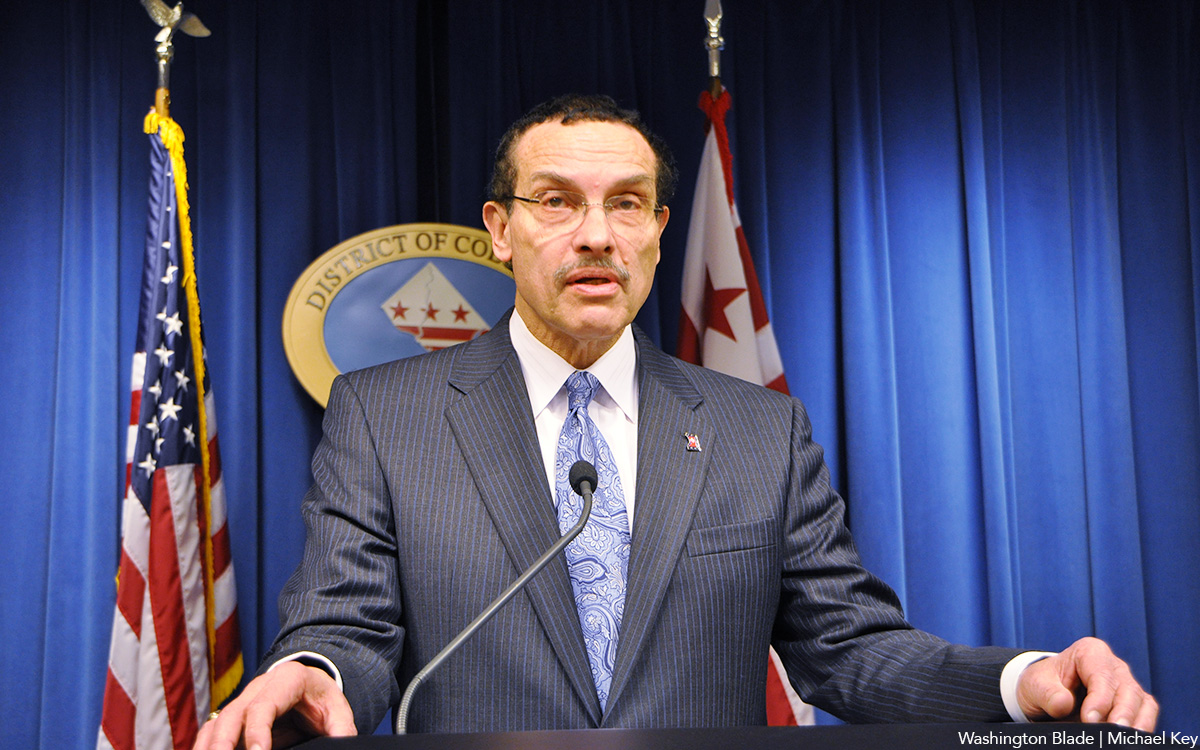
GLAA D.C., formerly known as the Gay & Lesbian Activists Alliance of Washington, announced on May 13 that it has awarded its highest ratings for D.C. Council candidates running in the city’s June 4 primary election to incumbent Council members Janeese Lewis George (D-Ward 4) and Robert White (D-At-Large) and to Ward 7 Democratic candidate Nate Fleming.
On a rating scale of +10, the highest possible rating, to -10, the lowest rating, GLAA awarded ratings of +9.5 to Lewis George, + 9 to Robert White, and +8.5 to Fleming.
Fleming is one of 10 candidates running in the Democratic primary for the Ward 7 Council seat, which is being vacated by incumbent Council member and former D.C. Mayor Vincent Gray, who is not running for re-election. In addition to Fleming, GLAA issued ratings for seven other Ward 7 Democratic contenders who, like Fleming, returned a required GLAA candidate questionnaire.
The remaining two Ward 7 candidates were not rated under a GLAA policy adopted this year of not rating candidates that did not return the questionnaire, the responses to which GLAA uses to determine its ratings, according to GLAA President Tyrone Hanley. A statement accompanying the GLAA ratings shows that it rated 13 D.C. Council candidates – all Democrats — out of a total of 18 Council candidates on the June 4 primary ballot.
Ballot information released by the D.C. Board of Elections shows that only one Republican candidate and one Statehood Green Party candidate is running this year for a D.C. Council seat. GOP activist Nate Derenge is running for the Ward 8 seat held by incumbent Democrat Trayon White and Statehood Green Party candidate Darryl Moch is running for the At-Large Council seat held by Robert White.
GLAA shows in its ratings statement that neither Trayon White nor Derenge nor Moch returned the questionnaire, preventing them from being rated. However, one of two Democratic candidates running against Tryon White in the primary — Salim Aldofo — did return the questionnaire and received a rating of +5.5. The other Democratic candidate, Rahman Branch, did not return the questionnaire and was not rated. Trayon White has been a supporter on LGBTQ issues while serving on the Council.
GLAA President Hanley said GLAA this year decided to limit its ratings to candidates of all political parties running for D.C. Council seats. In addition to candidates running for an At-Large Council seat and Council seats in Wards 4, 7, and 8, the June 4 primary ballot includes candidates running for the D.C. Congressional Delegate seat, the Shadow U.S. House seat, and the Shadow U.S. Senate seat. GLAA chose not to issue ratings for those races, according to Hanley. He said during mayoral election years, GLAA rates all candidates for mayor.
The Capital Stonewall Democrats, D.C’s largest local LGBTQ political organization, was scheduled to release its endorsements of D.C. Council candidates and candidates for all other local D.C. races, including Congressional Delegate and Senate and House “shadow” races, at a May 21 endorsement event. The Blade will report on those endorsements in an upcoming story.
Like in all past years beginning in the early 1970s when GLAA began rating candidates in local D.C elections, the group has not rated federal candidates, including those running for U.S. president. Thus, it issued no rating this year for President Joe Biden and two lesser-known Democratic challengers appearing on the D.C. presidential primary ballot on June 4 – Marianne Williamson and Armando Perez-Serrato.
In the At-Large Council race, GLAA gave Robert White’s sole Democratic challenger, Rodney Red Grant, who returned the questionnaire, a rating of +3.5.
“The ratings are based solely on the issues and may not be interpreted as endorsements,” GLAA says in its statement accompanying the ratings. The statement says the ratings are based on the candidates’ response to the questionnaire, the questions for which GLAA says reflect the group’s positions on a wide range of issues as stated in a document it calls “A Loving Community: GLAA Policy Brief 2024.” It sends a link to that document to all candidates to whom it sends them the questionnaire and urges the candidate to seek out the brief “for guidance and clarification” in responding to the questions. GLAA says the ratings are also based on the candidates’ record on the issues GLAA deems of importance, including LGBTQ issues.
Like its questionnaire in recent years, this year’s nine-question questionnaire asks the candidates whether they would support mostly non-LGBTQ specific issues supported by GLAA, some of which are controversial. One of the questions asks the candidates, “Do you support enacting legislation to decriminalize sex work for adults, including the selling and purchasing of sex and third-party involvement not involving fraud, violence, and coercion?”
Another question asks if the candidates would support decriminalizing illegal drug use by supporting “removing the criminal penalties for drug possession for personal use and increasing investments in health services.” Other questions ask whether candidates would address “concentrated wealth in the District by raising revenue through taxing the most wealthy residents,” would they support funding for “harm reduction and overdose prevention services to save lives,” and would they support a Green New Deal for Housing bill pending before the D.C. Council that would “Socialize Our Housing” to address putting in place city subsidized housing for those in need.
One of the questions that might be considered LGBTQ specific asks whether candidates would support sufficient funding for the D.C. Office of Human Rights to ensure the office has enough staff members to adequately enforce the city’s nondiscrimination laws and to end a discrimination case backlog that the office sometimes encounters.
Some activists have criticized GLAA for not including more LGBTQ-specific questions in its questionnaire. Others have defended the questionnaire on grounds that D.C. long ago has passed a full range of LGBTQ supportive laws and most if not, all serious candidates running in D.C. for public office for the past 20 years or more have expressed strong support for LGBTQ equality. They argue that LGBTQ voters, while weighing the depth of support candidates have on LGBTQ issues, most of the time base their vote on a candidate’s record and position on non-LGBTQ issues when all candidates in a specific race are LGBTQ supportive.
Hanley told the Washington Blade GLAA believes the current questionnaire addresses the issues of importance to the largest number of LGBTQ D.C. residents.
“My response is that we care about whatever issues are impacting queer and trans people,” Hanley said. “We can’t isolate the challenges we are experiencing as queer and trans people to things that are specifically related to our identity as queer and trans people because they are all interconnected,” he said.
“So, how will I tell a Black trans woman we care about her not being discriminated against at her job for being trans, for being Black, or for being a woman, but we don’t care that she doesn’t have housing? Hanley asked. “To me, that seems like a very inhumane way of thinking about human beings because we are whole human beings,” he said, some of whom, he added, face a wide range of issues such as homelessness, drug issues, and “struggling to make ends meet.”
The GLAA statement that accompanies its ratings, which is posted on its website, includes links to each of the candidates’ questionnaire responses as well as an explanation of why it gave its specific rating to each of the candidates. In its explanation section GLAA says all the candidates expressed overall support for the LGBTQ community and expressed support for the concerns related to the issues raised by the questions even if they were not at this time ready to back some of the issues like decriminalization of sex work.
Following are the GLAA ratings given to 12 Democratic D.C. Council candidates and one “unknown” candidate that Hanley says submitted their questionnaire but did not reveal their identity on the questionnaire:
DC Council At-Large
Robert White: +9
Rodney Red Grant: +3.5
DC Council Ward 4
Janeese Lewis George: +9.5
DC Council Ward 7
Ebony-Rose Thompson: +4.5
Ebony Payne: +5
Kelvin Brown: +2.5
Nate Fleming: +8.5
Roscoe Grant Jr.: +3.5
Veda Rasheed: +5
Villareal VJ Johnson II: +4
Wendell Felder: +2
DC Council Ward 8
Salim Aldofo: +5.5
Unknown: +2
The full GLAA ratings, a breakdown of the ratings based on a GLAA rating criteria, the candidate questionnaire response, and GLAA’s explanation for each of its candidate ratings can be accessed at the GLAA website.
District of Columbia
D.C. bill to study trans deaths faces opposition from LGBTQ advocates
Measure calls for creating Medical Examiner committee to identify trends
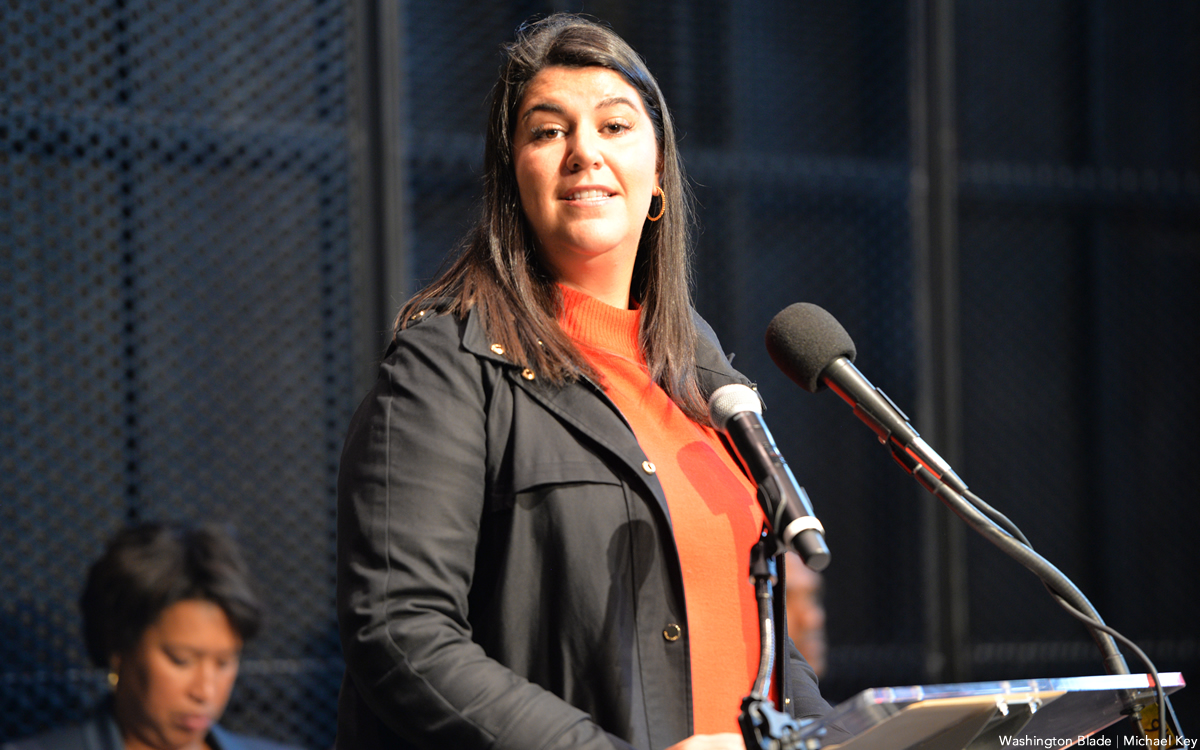
In a little-noticed development, D.C. Council member Brooke Pinto (D-Ward 2) introduced a bill in September 2023 calling for creating a special committee within the D.C. Office of the Chief Medical Examiner to determine and study trends related to the cause of death of transgender and “gender diverse” people in the District of Columbia.
The bill is called the Transgender and Gender Diverse Mortality and Fatality Review Committee Establishment Act. Among other things, it mandates that the medical examiner’s office through the newly created committee “identify and characterize the scope and nature of transgender and gender-diverse mortalities and fatalities, to describe and record any trends, data, or patterns that are observed surrounding transgender and gender-diverse mortalities and fatalities.”
In a development that some observers say caught Pinto off guard, officials with two prominent D.C. LGBTQ supportive organizations – the Whitman Walker Institute and the LGBTQ youth advocacy group SMYAL – expressed strong opposition to the bill in testimony submitted in April as a follow-up to a Council hearing on the bill conducted by Pinto on March 21.
Among other things, the officials – Benjamin Brooks, Whitman-Walker Institute’s Associate Director of Policy and Education; and Erin Whelan, SMYAL’s executive director, said the committee to be created by the bill to identify trans people who die would be an invasion of their and their families’ privacy. The two said the funds needed to pay for identifying whether someone who dies is transgender should be used instead for other endeavors, including supporting trans people in need, and protecting their rights.
The hearing record for the Council’s Committee on the Judiciary and Public Safety, which Pinto chairs and which conducted the hearing, shows that Brooks and Whelan were among four witnesses that testified against the bill. Six witnesses, including officials with the American Foundation for Suicide Prevention and Medical Society of the District of Columbia, testified in support of the bill.
Also testifying in support of the bill with suggested revisions was Vincent Slatt, who serves as chair of the D.C. Advisory Neighborhood Commission Rainbow Caucus.
Jenna Beebe-Aryee, Supervisory Fatality Review Program Manager for the Office of the Chief Medical Examiner, testified that the bill would be “remarkably challenging” for that office and its partnering city agencies to carry out, including what she said would be a difficult process of identifying whether someone who has died is transgender or gender diverse. But she did not state that her office and the Office of the Mayor outright oppose the bill.
The bill has remained in Pinto’s committee since the time of the hearing, with no indication from Pinto of what her plans are for going forward with the bill, including whether she plans to make revisions and if or when she may plan to bring the bill to the full Council for a vote.
Victoria Casarrubias, Pinto’s communications director, told the Blade last week that Pinto’s office had no immediate comment on Pinto’s plans for the bill.
The 17-page bill, according to its introductory summary page, would also “create a strategic framework for improving transgender and gender-diverse health outcomes for racial and ethnic minorities in the District,” and to “recommend training to improve the identification, investigation, and prevention of transgender and gender-diverse fatalities, and to make publicly available an annual report of its findings, recommendations, and steps taken to evaluate implementation of past recommendations.”
The bill authorizes the D.C. mayor to appoint the members of the newly created medical examiner’s committee and requires that members include representatives of six D.C. government agencies, including the Office of the Chief Medical Examiner; the departments of Health; Behavioral Health; Health Care Finance; Human Services; and the Mayor’s Office of LGBTQ Affairs.
It calls on the Office of LGBTQ Affairs to provide support to other city agencies in developing procedures for identifying transgender people who the agencies have provided services for and who have died.
It also requires the mayor to name as committee members representatives of organizations providing health care and services for the transgender community as well as a social worker specializing in transgender related issues and a college or university representative “conducting research in transgender and gender-diverse mortality trends or fatality prevention.”
Seven other members of the 13-member D.C. Council signed on as co-introducers of the bill. They include Council members Robert White (D-At-Large), Anita Bonds (D-At-Large), Christina Henderson (I-At Large), Matthew Frumin (D-Ward 3), Janese Lewis George (D-Ward 4), Charles Allen (D-Ward 6), and Vincent Gray (D-Ward 7).
Spokespersons for Gray and Bonds told the Blade the two Council members continue to support the bill and would consider any revisions that those who have expressed concern about the bill might suggest.
“The establishment of this committee will continue the District’s leading role in LGBTQIA+ advocacy and legislation,” Pinto states in a letter accompanying her introduction of the bill. “The Committee will be the first entity of its kind in the United States,” according to her letter.
Pinto cites in her letter studies and national data showing that deaths of trans people are disproportionately higher due to a variety of causes, including illness compared to cisgender people in the United States. “Trans women in particular are disproportionately vulnerable to the aforementioned risks, as well as to violence and murder, with one in four trans women likely to be victimized by a hate-related crime,” Pinto said in her letter.
“Although data are limited, some studies suggest that transgender people are ‘twice as likely to die as cisgender people’ due to ‘heart disease, lung cancer, HIV-related illness and suicide,’ with trans women being ‘two times as likely to die compared to cis men and ‘three times as likely’ compared to cis women,” Pinto states in her letter.
In their testimony against the bill, Brooks of Whitman Walker and Whalen of SMYAL said the problems they believe the bill will bring about outweigh the benefits that Pinto says it will provide for the trans community.
“It is improper for the District government to be investigating and determining someone’s gender identity,” Brooks said in his testimony. “This would require District agencies to coordinate investigations into deeply personal characteristics of many people,” he said. “This invasion of privacy is a poor use of the government’s time and energy.”
Brooks stated that the city has existing policies and requirements designed to find ways to improve the lives of transgender and gender diverse residents. He pointed to the LGBTQ Health Data Collection Amendment Act of 2018, which requires the Department of Health to produce a comprehensive report on the health and health disparities faced by the D.C. LGBTQ community. According to Brooks, the Department of Health has not released such a report since 2017.
“We strongly recommend that rather than proposing to spend precious time and scarce resources on a novel and invasive committee, the District should put those resources towards fulfilling existing data collection and reporting obligations,” Brooks states in his testimony.
Whelan of SMYAL expressed similar concerns in her testimony. “Transgender and Gender-Diverse (TGD) people do not need yet another violation of their privacy and exposure to more questions and interrogation for them to provide the reasons for the incredible amount of violence and loss the transgender and gender-diverse community faces,” Whelen says in her testimony.
“What we do need are solutions on how to address the underlying causes of anti-transgender violence, in addition to the barriers that prevent transgender and gender-diverse communities from accessing and maintaining safe and stable housing, and accessing affirming mental health resources,” Whelan adds in her testimony. “What we as a community need is diligent action in a positive direction to actually address the lack of resources, services, and violence towards this community.”
Supporters of the bill might point out that it includes strongly worded language calling for keeping personal information about transgender and gender-diverse people who die confidential and calls for criminal penalties for anyone who violates the confidentiality provision by disclosing the information, including whether a deceased person identified as transgender.
Brooks said strong grounds exist for not enacting the bill despite its privacy provision.
“The collection of sensitive information, particularly for decedents who cannot advocate for their own right to privacy, always raises the potential for inappropriate disclosure regardless of potential penalties,” he said. “The threat of criminal prosecution can be a deterrent to the intentional inappropriate sharing of private information; however, it may not stop accidental or inadvertent disclosure,” he said.
Slatt’s testimony calls for six specific suggested revisions in the bill pertaining to ways the newly created medical examiner committee would obtain information about trans people who die, including the suggestion that the Mayor’s Office of LGBTQ Affairs become involved in identifying trans people who pass away and be given one or more additional staff members to help support its increased responsibilities under the legislation.
“Members of the ANC Rainbow Caucus have discussed this proposed bill and find that it is a remarkable and historic step towards addressing trans and gender-diverse mortalities and fatalities,” Slatt says in his testimony.
“At a time when trans and gender-diverse people are under attack by municipalities across the nation, the District of Columbia is setting an example on how to create not just a culture of inclusion, but also a culture of belonging for trans residents,” he stated.
-

 Autos3 days ago
Autos3 days agoSeductive sport-utes: Buick Evista, Subaru Outback
-
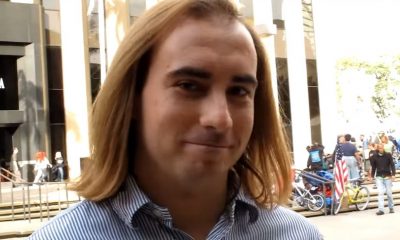
 Congress3 days ago
Congress3 days agoHouse ethics complaint filed over GOP staffer’s anti-trans email
-

 Sports5 days ago
Sports5 days agoNFL player’s misogynistic, homophobic comments spark outrage
-

 Real Estate3 days ago
Real Estate3 days agoYes, there are other coastal Delaware towns besides Rehoboth

